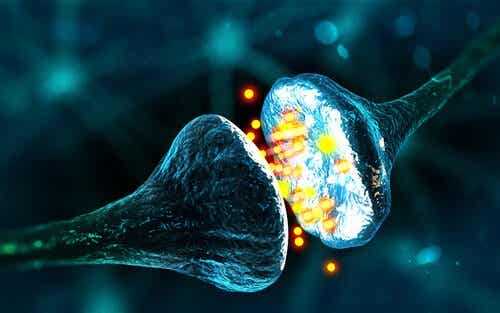
Last update: 06 September, 2020
Are you feeling excited, irritable, or sad for no apparent reason? Is it a sensation that invades you with a certain frequency? While there may be several explanations, one possibility is that you suffer from a deficiency in certain substances. Our brain can use up to 100 different neurotransmitters, and GABA it is one of the most important. Not surprisingly, it is known as the neurotransmitter of calm and relaxation.
Γ-aminobutyric acid (GABA) is an amino acid and neurotransmitter that regulates brain excitability by inhibiting the release of neurons. This mechanism generates a feeling of calm. Properly balancing GABA levels can reduce stress and anxietyas well as reduce the risk of certain diseases.
GABA: what is it and how does it work?
Γ-aminobutyric acid is one of the most important neurotransmitters (chemicals that brain cells use to communicate with each other). It is, in fact, the most widely used inhibitory neurotransmitter. Inhibitory neurotransmitters make it less likely that a nerve impulse will present itself with too much force.
The main function of γ-aminobutyric acid, as an inhibitory neurotransmitter, is to slow down brain activity. It is also involved in aspects such as: vision, sleep, muscle tone and motor control. Furthermore, it is widely distributed in and out of the central nervous system. It is also found in the intestines, stomach, bladder, lungs, liver, skin, spleen, muscles, kidneys, pancreas, and reproductive organs.
Diseases and disorders related to GABA dysfunction include autism, bipolar disorder, depression, schizophrenia, epilepsy, fibromyalgia, meningitis, certain types of dementia (Alzheimer's disease, Lewy body dementia, frontotemporal dementia) and certain intestinal disorders ( Crohn's, colorectal cancer, irritable bowel syndrome or IBS, ulcerative colitis).
Diseases characterized by involuntary movements, such as Parkinson's, tardive dyskinesia and Huntington's disease (HD), are also associated with low levels of this neurotransmitter.
One of the most important functions of γ-aminobutyric acid is its ability to reduce stress and anxiety. When its levels are low, the chances of feeling anxious, tired and very sensitive to stimuli increase. In this sense, an article published in the journal Nature stated that this neurotransmitter can specifically decrease unwanted thoughts that fuel stress, anxiety, depression and other mental disorders.
Another way γ-aminobutyric acid affects brain activity is by altering brain wave patterns. The presence of GABA it increases the brain waves associated with a state of relaxation (alpha waves) and decreases those associated with stress and anxiety (beta waves).
The balance of brain activity
To talk about how γ-aminobutyric acid works, we need to take into account another neurotransmitter, glutamic acid. This neurotransmitter is a natural byproduct of energy creation in the brain. One of the products of glucose metabolism in the brain.
These two neurotransmitters are complementary and opposite. Glutamic acid, as the main exciting neurotransmitter, balances the inhibitory effects of GABA. Excitatory neurotransmitters increase the chances of a nerve impulse skyrocketing. Therefore, and GABA delays brain activity, glutamic acid accelerates it.
These two neurotransmitters work together to balance brain activity. In addition to this, they can also transform into each other. Glutamic acid is the precursor of γ-aminobutyric acid, and the latter, in turn, can be recycled into glutamic acid, if necessary.
Low levels of GABA?
In most cases, a dysfunction in GABA levels can be directly attributed to lifestyle. In this sense, according to Dr. Datis Kharrazian, a researcher at Harvard Medical School, too much stress, a poor diet, lack of sleep, too much caffeine and gluten intolerance, are the causes of an alteration in the levels of GABA.
It should be considered that too intestinal bacteria produce this neurotransmitter, which is why dysbiosis, an imbalance between good and bad intestinal bacteria, can cause a very low production of GABA.
The excess of Glutamic acid then becomes GABA with the help of vitamin B6 and the enzyme glutamic acid decarboxylase. But a vitamin B6 deficiency or an autoimmune reaction can interfere with GABA production. Causes of this autoimmune reaction include autoimmune disorders, diabetes, gluten intolerance, celiac disease, and Hashimoto's disease.
On the other hand, there are many chemical changes that can affect the glutamic acid-GABA balance. With regard to consumable substances, caffeine inhibits the activity of GABA, while alcohol and sedatives increase it.
How to increase GABA levels?
There are GABA supplements that contain a synthetic version of this neurotransmitter. However, there are controversies regarding their effectiveness. It is not known whether, in supplement form, the neurotransmitter reaches the brain enough to take effect.
At the present time, no precise doses have even been established. Furthermore, research on the side effects of these supplements is not enough.
However, there are many other ways to maintain healthy levels of GABA. One of these is through nutrition. Researchers analyzed GABA contents in a wide variety of foods, such as brown rice germ, brown rice sprouts, barley sprouts, bean sprouts, green beans, corn, barley, brown rice, spinach, potatoes, potatoes. sweets, cabbage and chestnuts.
Research conducted by the Institute of Biosciences at the University of Cork, Ireland, revealed that probiotic foods increase γ-aminobutyric acid. Foods such as yogurt, chefir, kimchi and sauerkraut contain the bacterial strains that produce GABA: Lactobacillus brevis and Bifidobacterium denteum.
On the other hand, if you are concerned about your GABA levels, you have to minimize caffeine ingestion, as it inhibits the ability of this neurotransmitter to bind to its receptors. You can drink tea, which contains less caffeine, but has the amino acid l-theanine, which increases this neurotransmitter.
Another very effective way to increase levels of GABA is doing physical activity. Any type of physical activity increases the levels of this neurotransmitter, but yoga is the best. BAGA levels in the brain can increase by up to 27% after just one yoga session.


























